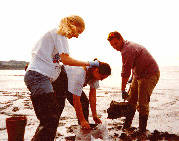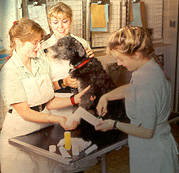Annual Report
1998-99
![]()

 |
Teaching quality |
Excellent scores
have again been achieved this year in subject reviews carried out by the
Quality Assurance Agency. Out of a maximum of 24, Biological Sciences
scored 22. The assessors observed 23 teaching sessions, which they found
to be of very high quality, with excellent levels of student participation
and well planned lectures enhanced by excellent visual aids. They considered
that the field courses and laboratory workshops were valuable, and student
feedback indicated that the quality of learning support provided by staff
was appreciated. The assessors concluded that the School ‘provides a traditional
specialised and focused biological education’, and praised the strong
research base which informs the teaching. Suggestions for improvement
included extensive refurbishment of the fabric of the building.
 |
Biological Sciences students sampling worm densities on mudflats of the Severn Estuary |
Physics achieved 23 points out of 24, with programmes which were academically sound and yet allowed for flexibility and student choice. The Department was praised for the excellence of its teaching and learning, and also for the level of pastoral support. The assessors noted the high quality of laboratories, with many examples of recent investment, and commented on the excellent support provided by technical, computing and secretarial staff. They suggested that the Department should review its procedures for the management of assessment. Bristol attracts large numbers of well-qualified students to its Physics courses. The assessors also commended the Department’s practice of targeting students with high potential from less advantaged backgrounds.
 |
The radio telescope on top of the H. H. Wills Physics Laboratory |
Mathematics and Engineering Mathematics also achieved the excellent score of 23 when they were jointly assessed. Both Departments, the assessment team noted, were making efforts to increase the number of applicants from state schools, and Engineering Maths had been particularly successful in attracting female students. The high quality of entrants was followed by high achievement at graduation and an impressive employment record. The assessors commended the curricula of both Departments and commented that the visiting industrialists in Engineering Maths had a very positive influence. Students confirmed that the Departments offered a supportive environment and that support was also extended to Maths students during their year abroad. A critical comment concerned the issues of recruitment, first-time pass rates and programme design in Engineering Maths.
 |
Computer algebra systems are widely used in the Department of Engineering Mathematics |
Innovative
training for educational psychologists
Psychologists employed in education services work with families, children,
teachers and schools. They advise on the best way to meet educational
needs and have to be skilled in techniques of assessment and intervention.
Traditionally, educational psychologists have spent most of their time
at individual case level (eg counselling a child with behaviour difficulties).
This year 16 students in the Graduate School of Education completed a successful new training programme to gain Masters Degrees in educational psychology. Nationally this is the first new training programme for educational psychologists in 25 years. It is unique in this country in focusing less on the individual child and more on research, strategy and organisation (eg evaluating differing ways of helping autistic children). Included in the year’s course are 75 days of supervised practice in LEA schools. A team of inspectors from the British Psychological Society who visited Bristol heralded the course as ‘innovative and forward looking’ and ‘designed to meet the challenges facing the profession in the coming years’. Tutors were praised for the ‘scholarly and critical approach’ and for ‘forging a way ahead’.
There have been 200 applicants for the 12 places available for entry in 1999, eight of which are to be funded by the Department for Education and Employment. All are qualified teachers with a degree in Psychology and two years’ teaching experience. A new doctoral programme in Educational Psychology has also been approved and Alec Webster, the director of the two courses, sees Bristol as providing the model for future training in this field.
A degree
for veterinary nurses
All qualified veterinary nurses hold a diploma awarded by the Royal College
of Veterinary Surgeons. However, the nurse in today’s veterinary practice
faces new challenges, and approval has recently been granted for a new
BSc in Veterinary Nursing and Practice Administration to be delivered
principally at the Veterinary School, Langford. For the first two years
students will focus on the nursing care of cats, dogs and other small
animals with such subjects as anatomy, physiology, anaesthesia, first
aid and trauma management. In the second half of the course they will
extend their experience to advanced surgical and medical techniques in
companion animals as well as the nursing care of the equine patient, and
will combine veterinary nursing with the principles of practice management.
An important component of the programme is the practical experience which
students will gain from working in veterinary practices and in the clinical
areas of the Veterinary School. This degree, only the second in the country,
is currently attracting school leavers, but it is hoped that eventually
it will be possible to allow entry to qualified veterinary nurses.
 |
Veterinary Nurses at Langford |
Teaching
tools
A visit to the Virtual factory is an enjoyable trip for anyone
interested in hot air balloons and how they are made. It is also an educational
experience for students of business and economics. This web-based simulation
modelled on Cameron Balloons in Bristol provides a lively demonstration
of how a factory runs. Students can tour the factory floor, meet the staff,
analyse the accounts, learn marketing theories, study research and development
as well as admiring the finished product in the form of balloons in amazing
shapes and sizes. This teaching tool was launched this year by the University’s
Institute for Learning and Research Technology (ILRT).
With Virtual economy you can be your own Chancellor of the Exchequer and see the impact of your policies on the economy and on a range of sample families. This new version of the economic simulation was developed by the ILRT in conjunction with the Institute for Fiscal Studies and the Economic and Social Research Council Macroeconomic Modelling Bureau at Warwick University. The on-line model, the focus of media attention at Budget time, is based on a model of 11 Downing Street, where each floor of the building has a series of different resources. The second floor, for example, is dedicated to the different economic variables of the model and the student can find explanations, worksheets, and relevant economic theories, while the library on the third floor provides information on famous economists, details on all types of economic theory and a full glossary of all the terms used. These Virtual worlds can be found at www.bized.ac.uk